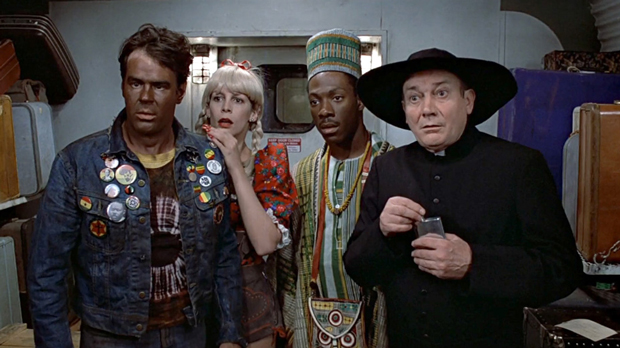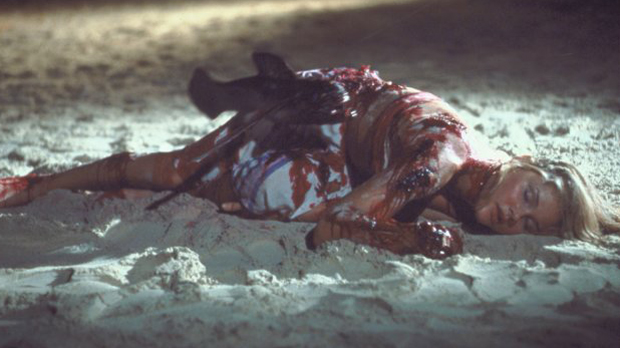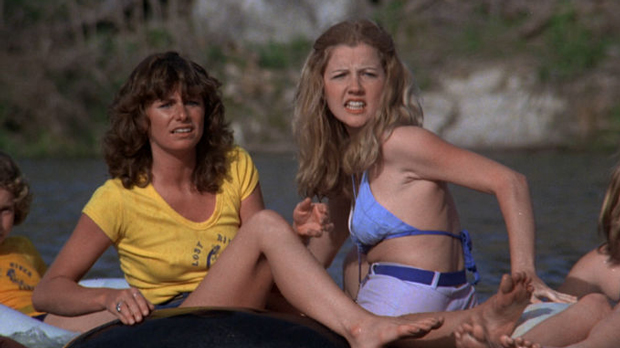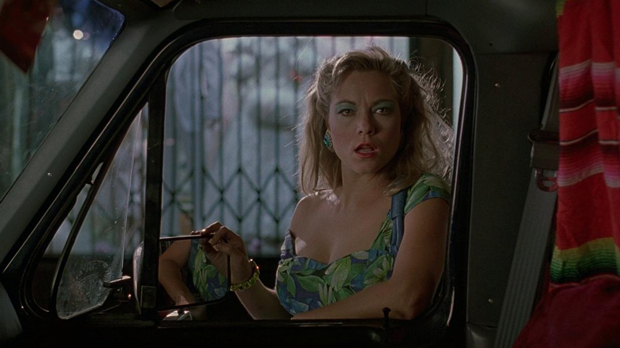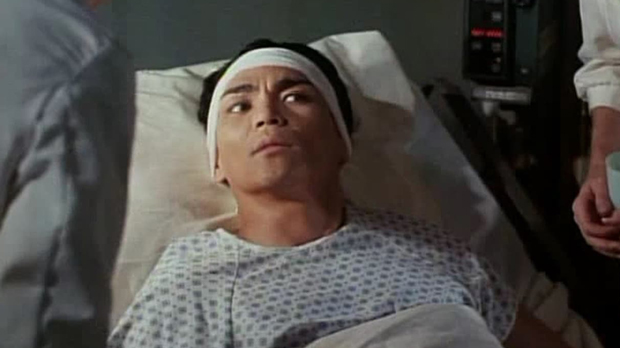 Trading Places (1983) Paramount/Comedy RT: 116 minutes Rated R (language, racial epithets, brief nudity, sexual references, drugs) Director: John Landis Screenplay: Timothy Harris and Herschel Weingrod Music: Elmer Bernstein Cinematography: Robert Paynter Release date: June 8, 1983 (US) Cast: Dan Aykroyd, Eddie Murphy, Jamie Lee Curtis, Don Ameche, Ralph Bellamy, Denholm Elliott, Paul Gleason, Kristin Holby, Robert Curtis-Brown, Alfred Drake, Ron Taylor, J.T. Turner, Richard Hunt, Jim Belushi, Frank Oz, Al Franken, Tom Davis, Steven Stucker, Kelly Curtis, Bill Cobbs, Bo Diddley, Philip Bosco. Box Office: $90.4M (US)
Trading Places (1983) Paramount/Comedy RT: 116 minutes Rated R (language, racial epithets, brief nudity, sexual references, drugs) Director: John Landis Screenplay: Timothy Harris and Herschel Weingrod Music: Elmer Bernstein Cinematography: Robert Paynter Release date: June 8, 1983 (US) Cast: Dan Aykroyd, Eddie Murphy, Jamie Lee Curtis, Don Ameche, Ralph Bellamy, Denholm Elliott, Paul Gleason, Kristin Holby, Robert Curtis-Brown, Alfred Drake, Ron Taylor, J.T. Turner, Richard Hunt, Jim Belushi, Frank Oz, Al Franken, Tom Davis, Steven Stucker, Kelly Curtis, Bill Cobbs, Bo Diddley, Philip Bosco. Box Office: $90.4M (US)
Rating: ****
If your knowledge of Eddie Murphy comedies doesn’t extend past The Nutty Professor or Norbit, you seriously need to expand your repertoire STAT! He didn’t always play multiple characters under heavy makeup in dumb (relatively) kid-friendly movies. There was a time when the star made comedies aimed at older audiences that were actually funny. After making an auspicious debut in the hit action-comedy 48 Hrs. opposite Nick Nolte, the former SNL cast member became a full-fledged movie star when he co-starred with Dan Aykroyd (The Blues Brothers) in Trading Places. It’s one of his best.
Directed by John Landis (Animal House), Trading Places is set in Philadelphia, the closest major city to where I grew up. This means I get to play the Spot the Familiar Location game every time I watch it. It takes place around Christmas. It’s one of the movies I watch every year around the holidays. It never gets old. That’s largely due to the perfect casting of Aykroyd and Murphy in the central roles.
Aykroyd plays Louis Winthorpe III, a snobby, Harvard-educated commodities broker who works for the film’s primary antagonists, Randolph (Bellamy, His Girl Friday) and Mortimer Duke (Ameche, Moon Over Miami). The super-wealthy brothers are on opposite sides of the nature vs. nurture debate. To settle their ongoing argument, they make a small wager. What would happen if a well-bred, well-mannered person like Louis was forced to trade places with somebody from the lower end of the social structure? That would be Billy Ray Valentine (Murphy), a street hustler we first meet posing as a blind, legless Vietnam vet. A misunderstanding leads to Louis having him arrested for attempting to steal his briefcase. This is the incident that sets things in motion.
The Dukes strip Louis of everything including his self-respect. They start by framing him for theft and drug possession which ruins his reputation. His fiancee (Holby) and so-called friends turn their backs on him. In the end, he has nothing and nobody to turn to for help. At the same time, they set Billy up in Louis’ old home and job. A good portion of Trading Places centers on the two men adjusting to their new circumstances. It’s not exactly an original story idea; it goes at least as far back as Mark Twain’s The Prince and the Pauper. HOWEVER, it’s not the least bit tired in the capable hands of Landis and his two leads who create fully developed characters we come to care about.
While Billy becomes a rising star in his new field (it turns out brokering isn’t too different from hustling), Louis tries to get his old life back with the help of Ophelia (Curtis, Halloween I & II), a prostitute with a heart of gold and thousands in T-Bills. She agrees to help him get back on his feet… for a fee, of course. In her first non-horror movie, Curtis shows real versatility and a natural flair for comedy. She takes a stock character and makes it her own by imbuing Ophelia with intelligence and confidence. She’s no dumb bimbo, this one. Additionally, she has great chemistry with Aykroyd and Murphy.
Trading Places works as well as it does because it relies more on character than plot. Not that it disregards plot altogether. After the Dukes settle their bet, they shift focus to a big commodities scam designed to make them richer than they already are. The principal characters figure out what they’re up to and concoct a scheme of their own to get even with the Dukes. It’s a familiar and expected plot trajectory that proves effective thanks to stellar work by the two leads. Aykroyd is at the top of his game as Louis, a pompous ass made sympathetic after falling victim to the machinations of the dirty Dukes. Murphy is at his best playing street smart, smart ass characters like Billy Ray. The way he bluffs his way through a stint in lock-up is priceless. It’s every bit classic Eddie as the redneck bar scene in 48 Hrs. Together, the two comic actors strike gold. Their differing comedy styles make for fantastic chemistry.
As Randolph and Mortimer, Bellamy and Ameche are equally great. First, it’s always nice to see old screen vets in action. Second, they create truly hateful characters whose actions border on sociopathy. They play with people’s lives like supervillains from a comic book without a single ounce of remorse. I’d be remiss if I didn’t mention Denholm Elliott (Raiders of the Lost Ark) whose droll butler provides a few of the movie’s laughs. He’s the best movie butler this side of John Gielgud’s Oscar-winning Hobson from Arthur.
In addition to its comic merits, Trading Places has plenty to say about racial prejudices and the division between the classes. Landis and his writers aren’t content to stay within the usual bounds of the premise. They explore human nature in general and racism in America in particular. In seeing life from the other side of the socioeconomic spectrum, both Louis and Billy Ray find strengths they never knew they possessed. It’s a surprisingly intelligent comedy reminiscent of the socially-conscious comedies of the 30s- e.g. My Man Godfrey, Sullivan’s Travels.
Trading Places makes great use of its locale. In that respect, it ranks alongside such great Philly-set films as Rocky and Philadelphia. Natives will undoubtedly recognize familiar landmarks like 30th Street Station, the Italian market and the Clothespin at 15th & Market. The City of Brotherly Love has never looked as clean as it does here. It looks as good as it does due to Robert Paynter’s amazing cinematography.
I suppose the most important thing about Trading Places is that it’s funny, VERY funny. It gets silly at times, but never loses its sharp edge. There’s a well-orchestrated scene on a New York-bound train involving a drunken New Year’s Eve party, a horny gorilla and a shady security guy played by perennial nasty a**hole Paul Gleason (Die Hard). It also has a lot of cool cameos by the likes of Jim Belushi, Frank Oz, Steven Stucker, Bo Diddley and the comic duo Tom Davis and Al Franken as lamebrained baggage handlers. The climax at the New York Stock Exchange is hard to understand if you’re not versed in the world of finance and stocks. It doesn’t matter though; you’ll get the gist of it and that’s all that really counts.
Trading Places is one of the best comedies of the 80s. It’s still funny four decades later. True, some of its attitudes are outdated and un-PC, but I wouldn’t call it offensive. They reflect the time in which the movie was made. Also, they’re used to make a point about societal attitudes about race and class. It’s unusually insightful for a comedy. There’s a reason people still watch it today. It is the very definition of a comedy classic.
